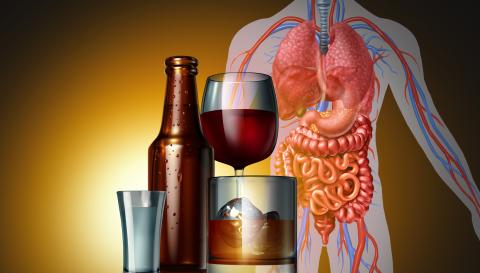Short and Long Term Health Risks of Alcohol
Please note that some links to federal government websites may be broken due to new presidential actions.

Alcohol has immediate effects on health. Some of these are:
- Alcohol can cause dehydration. Consuming alcohol decreases the body’s production of the anti-diuretic hormone, resulting in the body retaining water. While drinking, increased urination and excessive sweating may occur, depending on one’s weight. Alcohol poisoning can also cause dehydration due to vomiting. Alternating between alcoholic beverages and water can help prevent dehydration.
- Alcohol can cause weight gain. When alcohol is in your system, it is harder to burn fat because the body will burn the acetate in alcohol first. This increases the likelihood of storing fat from other calories consumed that day. Alcohol also stimulates the appetite, potentially resulting in eating more.
- Alcohol can lower blood sugar levels. Drinking alcohol increases insulin secretion. Low blood sugar can be especially dangerous for diabetics and can cause lightheadedness and fatigue.
- Alcohol can disturb sleep patterns. Although drinking alcohol can help you fall asleep faster, you spend less time in the deep, Rapid Eye Movement (REM) stage, affecting the quality and length of sleep.
- Alcohol can bloat your belly and face. Different drinks contain calories loaded with sugar and carbohydrates. Muscles store carbohydrates for energy, causing the body to retain more water.
- Alcohol can increase stress and anxiety. While some may drink alcohol to decrease stress and anxiety, drinking in excess and crossing over into the blood alcohol concentration danger zone will worsen these feelings. Becoming dependent on alcohol to relieve stress and anxiety can increase the risk of developing an alcohol use disorder and other negative health outcomes.
Drinking in moderation can minimize these effects and risks.
Defining excessive alcohol use
The CDC defines excessive alcohol use as:
- Binge drinking –Drinking four or more drinks on an occasion for a woman, or five or more drinks on an occasion for a man.
- Heavy drinking – Eight or more drinks per week for a woman, or 15 or more drinks per week for a man.
- Alcohol use by people under the minimum legal drinking age.
- Alcohol use by pregnant women.
Excessive alcohol use was responsible for more than 140,000 deaths in the U.S. each year during 2015-2019, shortening the lives of those who died by an average of 26 years.
Among adults 20-49 years, excessive drinking was responsible for 1 in 5 deaths.
By not drinking too much, you can reduce the serious health risks from alcohol.
Short-term health risks
- Injuries, such as vehicle crashes, falls, drownings, and burns.
- Violence, including homicide, suicide, sexual assault, and intimate partner violence.
- Alcohol poisoning – a medical emergency that results from high blood alcohol levels.
- Risky sexual behaviors, including unprotected sex or sex with multiple partners. These behaviors can result in unintended pregnancy or sexually transmitted infections.
- Miscarriage and stillbirth or fetal alcohol spectrum disorders (FASDs) among pregnant women.
Long-term health risks
Excessive alcohol use can lead to the development of chronic diseases and other serious problems, including:
- High blood pressure, heart disease, stroke, liver disease, and digestive problems.
- Cancer of the breast, mouth, throat, esophagus, voice box, liver, colon, and rectum.
- Weakening of the immune system, increasing the chances of getting sick.
- Learning and memory problems, including poor school performance and dementia.
- Mental health problems, including depression and anxiety.
- Social problems, including family problems, job-related problems, and unemployment.
- Alcohol use disorders, or alcohol dependence.
More information about these health risks can be found on the CDC website.
Blackouts and alcohol poisoning
A blackout is when an intoxicated person who has consumed a large amount of alcohol cannot recall key details of an event or even the entire event. Just one blackout can lead to permanent brain damage and other negative consequences.
Alcohol poisoning occurs when there is so much alcohol in the bloodstream that areas of the brain that control basic life-support functions – such as breathing, heart rate, and temperature control – begin to shut down. Even if a person survives an alcohol poisoning, it can cause major damage to the brain. Vomiting is typically, but not always, the first sign of alcohol poisoning as the body tries to eliminate the toxin. Without timely medical attention, a person’s condition could worsen, causing the heart to stop and breathing to cease. Sadly, alcohol poisoning happens too often, especially in college settings, youth parties, and during drinking games and other activities where heavy drinking is happening and encouraged.
Signs and symptoms of alcohol poisoning:
- Mental confusion, stupor
- Difficulty remaining conscious or inability to wake up
- Vomiting
- Seizures
- Slow breathing (fewer than 8 breaths per minute)
- Irregular breathing (10 seconds or more between breaths)
- Slow heart rate
- Clammy skin
- Dulled responses, such as no gag reflex (which prevents choking)
- Extremely low body temperature, bluish skin color, or paleness
Take Action
- Roll them on their side.
- Call 911.
- Don’t leave them alone.
- Begin CPR if their heart stops.
Good Samaritan Law
Anyone under the age of 21 cannot be charged with minor in possession of alcohol if they call 911 to help someone suffering from alcohol poisoning. The person with alcohol poisoning is also protected from minor in possession charges.